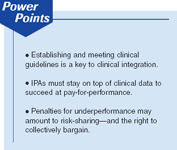Article
For this IPA, P4P pays off
Free to negotiate collectively, this Denver group hits its targets thanks to newfangled technology and old-fashioned nagging.
A raise of 4 percent barely beats inflation, but if you're a primary care physician, you'd probably take it.

It's a solid accomplishment for an IPA with such a low profile that one local healthcare administrator we interviewed thought the group was defunct. Three years ago, however, MedSouth made headlines when the FTC gave it a green light to collectively negotiate fee-for-service contracts like the one with Anthem. That decision meant the IPA wouldn't run afoul of antitrust laws. The FTC's blessing on MedSouth hinged on the group fulfilling its promise to become "clinically integrated"-that is, to deliver coordinated care based on practice guidelines, to share clinical information electronically, and to hold themselves accountable for meeting (or missing) performance benchmarks.
Guidelines and computerization are works in progress Other IPAs make headlines because the FTC prosecutes them for price-fixing-collectively negotiating contracts as if they were a group practice. It's not illegal, though, if IPA doctors share substantial financial risk, as in capitation. IPAs have negotiated capitation contracts for years, but MedSouth stopped doing so about four years ago. Besides being unprofitable, they weren't good for patients, says internist and MedSouth medical director Ellen Burkett. "Capitation is wrong," she says, "because it rewards you for not providing care."
But what if IPA doctors could share something besides financial risk? What if they shared a commitment to improved patient care, and backed it up with practice guidelines and a system to implement them? Would that kind of effort legitimize collective bargaining, absent financial risk-sharing? MedSouth made that case to the FTC, and in 2002, the Feds replied, in essence, "Sounds like a good idea-we won't challenge you." The FTC stipulated, however, that MedSouth physicians should be free to individually contract with payers that won't deal with the IPA.
Heartened by this decision, the IPA built its framework for clinical integration.
Practice guidelines are the foundation. So far, the Denver doctors have instituted 65, drawn from the American Cancer Society, the National Institutes of Health, the Agency for Healthcare Research and Quality, and similar organizations. The goal is to assemble enough guidelines to cover most diagnoses that the physicians typically make.
Connecting doctors electronically also is a work in progress. MedPlus, a subsidiary of Lyndhurst, NJ-based Quest Diagnostics, provides a Web portal where doctors can write prescriptions, access lab results and radiology reports, and verify patients' insurance eligibility. Perhaps most importantly, IPA administrators can tap the data stored with MedPlus to determine how the entire group-as well as individual doctors-is measuring up to performance goals for preventive screenings and disease management.





